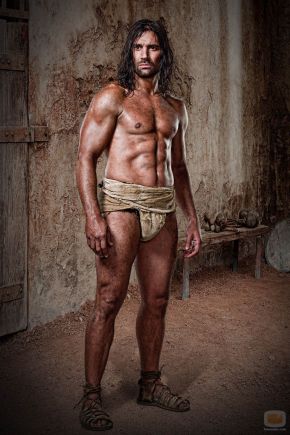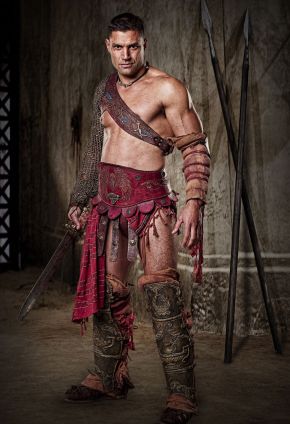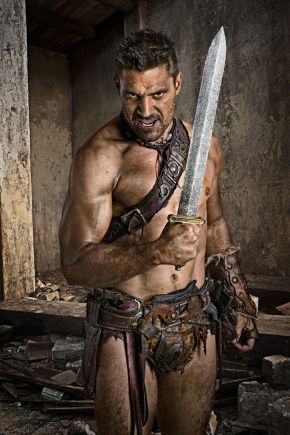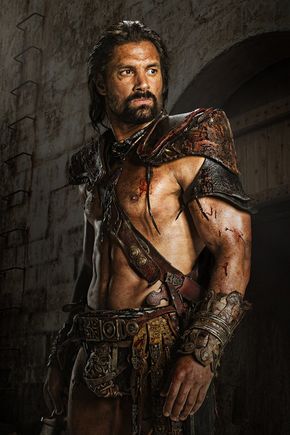
Crixus (Blood and Sand)
From The Character Database
| Crixus (Blood and Sand) | |
|---|---|
| Vital statistics | |
| Names | Crixus, The Undefeated Gaul, |
| Gender | Male |
| Race | Human (Gaul) |
| Occupation | Gladiator, Rebel Leader |
| Origin | Spartacus Blood and Sand Episode 1: "The Red Serpent" (January 22, 2010) |
| Alignment | Good |
| Age | 30s |
| Created By | Stephen S. DeKnight, |
| Height | 180 cm (5'11") |
| Weight | 86 kg (190 lbs) |
| Personality Type | {{{personality type}}} |
Crixus is a pivotal figure in the Spartacus series, begins his journey as a slave introduced to Batiatus' ludus, driven by a fierce desire to become a gladiator. Known as the former Champion of Capua, he rises through the ranks to become one of the top gladiators. At the onset of "Blood and Sand," Crixus is depicted as Spartacus' primary rival and the lover of Naevia. Following Naevia's banishment, Crixus allies with Spartacus, leading a rebellion against the House of Batiatus and, eventually, Rome itself. He evolves into a trusted ally and one of the foremost leaders of the rebellion, earning the title of the Undefeated Gaul.
Appearance:
Crixus is portrayed as a robust and muscular man, his body marked by the scars of numerous battles. Initially, he arrives at the ludus with long black hair and a thick beard, appearing somewhat shorter than his peers. Under the direction of Lucretia, he adopts a clean-shaven look with cropped hair, shedding his rugged image to meet her standards. As the rebellion unfolds and Crixus escapes the ludus, his rigorous training diminishes, leading to a slight loss in muscle mass. However, he retains his formidable presence. In "War of the Damned," Crixus regains much of his original build, sporting a neatly maintained beard and longer hair. He dons distinctive makeshift armor, marking his role as a commander, and continues to wield a sword and shield.
Personality:
Upon his arrival at the ludus, Crixus is initially insecure but deeply motivated to become a gladiator. Despite being mocked by fellow gladiators like Barca and Auctus, he remains focused on his training, idolizing Gannicus and aspiring to earn the mark of a true gladiator. As his skills improve, so does his confidence, evolving into a somewhat arrogant demeanor. Despite this, Crixus fights to honor his family's memory and is dedicated to the life of a gladiator, seeking glory and honor in the arena. He holds other gladiators to high standards and looks down on those who don't share his fervor. However, Crixus also reveals a gentler side through his love for Naevia. Their bond grows so deep that they become inseparable, believing their love transcends both the mortal world and the afterlife. When their love is threatened, Crixus unleashes a berserker's fury against their enemies, sparing none.
As a leader in the rebellion, Crixus embraces Spartacus as a brother, though their leadership styles often clash. Crixus is more impulsive and aggressive, leading to occasional power struggles with Spartacus.
Combat Prowess:
Crixus comes from a lineage of warriors, and his combat skills are honed through rigorous gladiator training. Initially seen as a mere brute, he rapidly develops into a formidable fighter, eventually earning the title of the Undefeated Gaul and Champion of Capua. This prestigious title reflects his exceptional prowess in both the arena and on the battlefield. Crixus' fighting style is characterized by brute strength and grounded attacks, in contrast to the nimble, acrobatic movements of Spartacus and Gannicus. Nonetheless, he remains highly athletic and fearlessly charges into battle. He favors a sword and shield combination, often beginning fights by leaping into the fray, toppling enemies, and breaking through Roman defensive lines.
Biography
Early Life: Crixus was born in Gaul into a lineage of warriors, including his brother Doiros and three other brothers. Tragedy struck his early years when the Arverni tribe invaded his village, slaughtering his family before his eyes. He was then captured and sold into slavery, eventually falling into the hands of Tullius. As a slave, Crixus was forced to labor on the construction of the very arena where he would later battle as a gladiator.
Gods of the Arena
Enslavement and Initial Training: Crixus begins his journey as a slave under Tullius, tasked with carrying stones for the new arena, overseen by the brutal Appius. During a fight with another slave, Batiatus intervenes, buying Crixus for fifty denarii, a sum well above a slave's typical worth, hoping to gain favor with Tullius.
Upon arriving at Batiatus' ludus, Crixus is placed in a cell with Ashur, Dagan, and Indus. While Dagan mocks Crixus for his small stature, Ashur offers him a warmer welcome. Ashur recounts how he and the other recruits have survived, explaining that their training culminates in a final test to earn the mark of the Brotherhood. Crixus reveals he started the fight to catch Batiatus' attention and prove his potential as a gladiator.
Despite initial taunts and hazing from gladiators like Auctus and Barca, Crixus forms a friendship with Ashur. However, during training, Crixus is frequently bested by his peers until Batiatus assigns Oenomaus to train him in gladiatorial combat, emphasizing the importance of never lowering his guard.
Rise to Prominence: As Crixus' skills improve, he manages to land a strike on Oenomaus during training. He seeks advice from Gannicus on how to become a champion, and Gannicus advises him to never lose. In a demonstration for Varis, Crixus battles Gannicus and, despite being outmatched, impresses Gaia enough for her to spare his life.
Oenomaus, now Doctore, arranges a fight between Barca and Crixus, which Crixus loses. Gannicus later advises Crixus on how to counter Barca's spear technique. Eventually, Crixus is chosen to fight Auctus in the old arena. Initially at a disadvantage, Crixus gains the upper hand and kills Auctus, earning the mark of the Brotherhood and the respect of Barca, despite his loss of Auctus.
Becoming a Gladiator: Following Auctus' death, Crixus garners respect within the Brotherhood and ceases to be insulted by Barca. He shares his tragic past with Barca, fostering a deeper bond. Crixus continues his training, growing more skilled and successful in the Ludus rankings.
When summoned by Lucretia, Crixus is tasked with impregnating her to produce an heir for Batiatus. Despite his discomfort, he complies, maintaining his role as a gladiator. Lucretia also orders his long hair and beard to be shorn, leading to his clean-shaven, buzz-cut appearance.
Conflict and Championhood: In the Primus, Batiatus' gladiators face Solonius' men in a team melee. Despite being outnumbered, Crixus seeks a battle with Gannicus. During the fight, Crixus cripples Ashur to confront Gannicus alone. However, Gannicus, concerned for Crixus' safety, throws him out of the ring, preventing him from becoming Champion. Gannicus wins the fight and is granted his freedom.
At Gannicus' farewell, Crixus laments their missed match but is encouraged by Gannicus to win his freedom and find him. Gannicus gifts Crixus the necklace of champions, urging him to wear it with honor. Ashur, now crippled and scarred, harbors a lasting grudge against Crixus.
Period Before "Blood and Sand"
In the five-year span between "Gods of the Arena" and "Blood and Sand," Crixus rises to become the Champion of Capua, a title that cements his legendary status in the arena.
Rise to Fame: Crixus' popularity soars following his epic victory over the infamous Gargan Twins. These twins, described as the "sons of a prostitute raped by a jackal," had wreaked havoc in Capua. After their capture, they were condemned to die in the arena but defied fate by surviving through cannibalism, feasting on gladiators from the House of Solonius. The twins' ferocity made them feared opponents, and no one dared to challenge them—except Crixus. In a grueling and bloody battle, he overcame the Gargan Twins, killing them both and solidifying his status as a legend in the arena.
Service to Lucretia: During this period, Crixus continues to serve Lucretia not just as a gladiator but also as her sexual servant. Over time, Lucretia becomes deeply infatuated with him, viewing him as more than just a servant—a lover. Despite this, Crixus' own affections begin to shift. He develops feelings for Naevia, Lucretia's body servant, which adds a complex layer to his relationships within the House of Batiatus.
This chapter of Crixus' life marks his transformation from a skilled fighter into a celebrated and revered figure in Capua, navigating both the brutal demands of the arena and the intricate dynamics of his personal attachments.
Blood and Sand
As Spartacus arrives at the ludus, Crixus holds the prestigious title of Champion of Capua and stands as the top gladiator in the house of Batiatus. His prowess and reputation make him the de facto leader among the gladiators, second only to Doctore in authority. He is also closely allied with Barca, another prominent gladiator.
Initial Rivalry with Spartacus: From the outset, Crixus clashes with Spartacus, disliking the Thracian’s pride and disdain for the gladiatorial life. Their rivalry intensifies when Spartacus, during his final test as a trainee, defeats Crixus by exploiting a slip caused by Spartacus' keepsake from his wife. This victory marks the first time Crixus is bested, setting the stage for ongoing tension and competition between them.
When Spartacus maneuvers to avoid fighting his friend Varro, Crixus and Spartacus are pitted against each other in the arena once more. This time, Crixus dominates but refrains from delivering a fatal blow when Spartacus surrenders. This encounter further fuels their rivalry and mutual determination to prove themselves superior.
Relationship with Lucretia and Naevia: Crixus becomes Lucretia's favored gladiator and lover, a secret affair that she keeps hidden from her husband, Batiatus. Through these encounters, Crixus meets Naevia, Lucretia’s personal servant. Struck by Naevia's beauty, Crixus gives her a necklace to express his feelings. However, Naevia returns it, fearing Lucretia's wrath if she were seen wearing it. Misunderstanding her actions, Crixus presents the necklace to Lucretia instead, angering Naevia. Despite this rocky start, Crixus and Naevia grow closer, and she eventually steals a key to allow them to meet in secret at night.
Battle Against Theokoles: Crixus’ next significant challenge is his battle alongside Spartacus against Theokoles, an undefeated giant. Initially, their cooperation is strained, but they eventually unite under a shared motivation to fight for their respective loved ones. They manage to bring down Theokoles together, but he rises again, and their teamwork falters. Crixus is severely wounded, leaving Spartacus to land the final blow and claim the title of Champion of Capua.
Recovery and Relegation: Crixus’ recovery from his injuries is long and difficult. During this time, he struggles with feelings of uselessness and the fear of losing his status. Naevia remains his steadfast supporter, encouraging him through his convalescence. At one point, Batiatus considers selling Crixus, but the thought of leaving Naevia and the ludus drives Crixus to prove his worth by passionately pleasing Lucretia, as Naevia suggests. When Spartacus is attacked by Segovax, Crixus intervenes, saving his life and cementing his place in the ludus despite their differences.
Restoring Honor: As Crixus returns to active training, he seeks to reclaim his honor in the arena. He finds redemption and regains his former glory by defeating the renowned gladiator Pericles. Meanwhile, Ashur, harboring a deep grudge against Crixus for their past conflict, discovers Crixus and Naevia’s secret relationship. In revenge, Ashur demands Naevia for his own pleasure from Batiatus. When Crixus learns of this, he violently attacks Ashur in front of Legatus Gaius Glaber and other spectators, leading to severe punishment. Batiatus orders Crixus to be publicly whipped by Doctore, and Naevia is expelled from the villa, sent away to an unknown location.
Joining the Rebellion: Batiatus arranges a deadly match between Crixus and Spartacus to celebrate securing Glaber’s patronage. During his imprisonment, Doctore visits Crixus, promising to help him find Naevia if he becomes lanista. Batiatus, wanting Crixus to lose, poisons his food to weaken him. Before the fight, Spartacus tries to convince Crixus to join a rebellion against Batiatus. They strike a bargain: if Spartacus wins, he will find and free Naevia; if Crixus wins, he will one day kill Batiatus.
As the fight commences, Spartacus informs Crixus of the poison, and when Crixus feels its effects, he realizes the truth of Spartacus’ words. This betrayal pushes him to ally with Spartacus. During the fight, Spartacus uses Crixus' shield to launch himself into the balcony where the Romans are seated. As Spartacus is intercepted by Oenomaus, Crixus cuts the whip restraining Spartacus, allowing him to join the fight and kill the guards. Crixus then rallies the gladiators with a cry to "KILL THEM ALL!!" and they charge at the Roman soldiers.
The Revolt: Amid the chaos, Crixus explains to Oenomaus the treachery of Batiatus, revealing the murder of Spartacus’ wife and the poisoning. Disillusioned, Oenomaus joins their cause. Crixus leads the gladiators through the villa, confronting Lucretia and demanding Naevia’s location. When Lucretia claims she is carrying his child, Crixus, horrified at the thought of the child being raised by her, stabs her in the stomach, leaving her for dead. He witnesses Spartacus’ final confrontation with Batiatus and watches as Spartacus kills him.
Inspired by Spartacus’ resolve to exact revenge on Rome, Crixus leaves the ludus with the other gladiators, ready to bring retribution to their oppressors.
Vengeance
Post-Massacre Leadership and Tensions: After the brutal events at Batiatus' villa, Crixus emerges as a key leader in Spartacus' burgeoning rebellion. Commanding a group of Gauls, he serves as second-in-command, showcasing his tactical prowess and fierce loyalty. His primary mission is to find Naevia, his love, who has been sold into slavery.
However, his personal quest for Naevia creates friction with Spartacus. Crixus demands immediate action to find her, while Spartacus advocates for a strategic approach to ensure their survival and the broader success of their cause. This difference in priorities nearly fractures the Rebel Army, causing a significant divide among the rebels.
Pursuit and Rescue of Naevia: Crixus' obsession with rescuing Naevia leads him to attack a nearby brothel upon receiving a tip that she might be there. Despite the brothel attack yielding no results, Crixus remains undeterred. He later learns from a slaver that Naevia has been sold multiple times, further fueling his determination.
During this period, Crixus faces challenges in leadership as Spartacus rushes into dangerous situations, such as confronting Glaber alone. Crixus, along with Agron and others, rescues Spartacus, emphasizing the importance of unity and caution in their rebellion.
Struggle for Naevia's Whereabouts: Crixus' relentless search continues, leading to the attack on a ludus, where he learns Naevia was previously held. He kills the dominus in a fit of rage when he realizes Naevia has been sold off again, showcasing his deep emotional turmoil and love for her.
A major turning point occurs when Agron, out of a desire to protect the group from a potentially suicidal mission, lies to Crixus, saying that Naevia is dead. This deception leads to internal conflict within the rebels. However, Nasir, feeling guilty, reveals the truth, and Crixus, filled with rage and relief, leads a mission to the salt mines where Naevia is finally found.
Reunion and Continuing Battles: The reunion with Naevia is bittersweet. She has been deeply traumatized by her experiences, and Crixus is devastated to see her so changed. Despite this, their bond remains strong, and they find solace in each other. Naevia insists on learning to fight, and Crixus supports her, teaching her to defend herself and empowering her to seek her own vengeance against the Romans.
Crixus also reconnects with Gannicus, and despite Gannicus' initial reluctance to join the rebellion, Crixus remains steadfast in his commitment to Spartacus' cause.
Ambushes and Conflicts: As the rebels continue their fight, they face numerous ambushes and conflicts. Crixus participates in various battles, demonstrating his unyielding courage and tactical skill. He fights alongside Spartacus and Agron in ambushes and defenses, including a major confrontation in the temple where they successfully repel Varinius' forces.
Personal Vendettas and Training Naevia: Crixus' personal vendetta against Ashur culminates when Ashur arrives to negotiate terms of surrender. Crixus demands Ashur's death, but Naevia insists on fighting him herself. Despite the danger, Crixus honors her wish, watching in agony as she battles Ashur. Naevia ultimately triumphs, and Crixus is filled with pride and love for her resilience and strength.
As they prepare for the final siege, Crixus and Naevia's relationship deepens, with Naevia becoming a capable warrior under Crixus' tutelage. Their love is rekindled, and they find new purpose in their shared mission against the Romans.
Final Siege and Victory: In a daring plan, Spartacus decides to use vines to descend from Mount Vesuvius and launch a surprise attack on the Romans. Crixus is chosen to lead the assault along with Spartacus, Gannicus, and Agron. They successfully execute the plan, catching the Romans off guard and securing a crucial victory.
Crixus takes great pleasure in the fight, reveling in the defeat of their oppressors. As the battle ends, Spartacus proclaims that it is time to become an army, and Crixus roars in agreement, symbolizing his full commitment to the rebellion and his deep bond with Spartacus as they prepare for the war against Rome.
War of the Damned
In "War of the Damned," Crixus remains a pivotal character in the rebellion led by Spartacus against the Roman Republic. His journey throughout the final season is one of intense battles, personal vendettas, and deep loyalty to his love, Naevia. His actions are driven by a combination of revenge against the Romans and a fierce desire for freedom.
Commanding in Battle
Crixus continues to serve as one of Spartacus' most trusted generals. Alongside Spartacus and Gannicus, he takes a proactive role in leading the rebel forces. After defeating the forces of Cossinius and Furius, Crixus discovers that Marcus Crassus is assembling a formidable force of 10,000 soldiers to crush the rebellion. In a strategic move, Spartacus, Crixus, and Gannicus infiltrate a Roman villa, dispatching Cossinius and Furius in a swift and brutal raid, showcasing their prowess and unity as leaders.
With winter approaching, the rebels set their sights on the city of Sinuessa. Crixus, hardened by his experiences and driven by a deep-seated hatred for the Romans, takes a particularly ruthless approach. During the conquest, he opposes Spartacus' more merciful stance towards Roman civilians. This conflict is epitomized when Crixus forces two Roman captives to fight to the death for a piece of bread, a stark display of his hardened perspective on their cause.
Tensions and Loyalty
As the rebellion grows, so do internal tensions. Crixus' mistrust of the Cilician Pirates, who have aligned with Spartacus, creates friction. He doubts their loyalty and fears they may betray the rebels. This suspicion is exacerbated by Naevia’s increasing hatred for all things Roman, which influences Crixus' actions. Her deepening anger leads her to kill Attius, a blacksmith friend of Gannicus, under the mistaken belief that he is aiding the Romans. This act drives a wedge between Crixus and Spartacus, as well as other members of the rebellion.
Crixus' relationship with Naevia is a central part of his character arc. He trains her to be a warrior, and together they share a bond forged in the fires of their mutual struggle and love. However, Naevia's trauma and bitterness towards the Romans sometimes push Crixus towards more extreme actions, highlighting the personal toll the rebellion has taken on them both.
The Breaking Point
The increasing divergence in strategies between Spartacus and Crixus reaches a critical point. Crixus is impatient with Spartacus' more cautious and strategic approach. He becomes frustrated with Spartacus' decisions, especially when Spartacus plans to negotiate and seek alliances rather than directly confront the Roman forces. This culminates in a confrontation where Crixus incites the massacre of Roman prisoners, including Laeta, who had been promised safety by Spartacus. Spartacus intervenes, chastising Crixus and accusing him of forgetting the rebellion's true cause. This moment starkly illustrates the deepening rift between them.
Crixus' determination to take bold, decisive action leads him to propose a daring plan: march on Rome itself. Believing that attacking the heart of the Roman Republic will cripple their enemy and inspire their followers, Crixus decides to split from Spartacus. Before leaving, he shares a poignant farewell with Spartacus, acknowledging their brotherhood and the different paths they have chosen.
The Final Campaign and Death
Crixus' march towards Rome is marked by fierce battles and strategic ingenuity. He devises a plan to use fireballs—giant balls of twine soaked in oil and set alight—to disrupt Roman formations. At the gates of Rome, Crixus gives a rousing speech to his followers, invoking the spirit of their past victories and urging them to fight with the same ferocity. His battle cry, a variation of his gladiatorial shout "Shall I begin?", now becomes "Shall we begin?", rallying his men for the impending fight.
The initial assault is successful, with Crixus and his army breaking through the Roman lines using their fiery projectiles. They manage to sow chaos and panic among the Roman troops. Crixus personally slays many soldiers, including Arrius, by driving a sword through his face. However, their victory is short-lived as Crassus and his larger, more disciplined army arrive on the scene.
In a desperate and brutal final stand, Crixus realizes they are outnumbered and overpowered. Despite ordering his forces to retreat to higher ground, he is filled with rage and determination to strike a final blow against the Romans. Spotting Crassus, Crixus seizes a spear with the intent to kill him, but is intercepted by Caesar. The two engage in a fierce duel, during which Crixus is initially wounded. Naevia intervenes, giving Crixus a moment to recover and continue fighting.
Crixus regains the upper hand against Caesar but is ultimately struck down by Tiberius, who impales him from behind with a spear. Mortally wounded, Crixus falls to his knees, surrounded by Roman soldiers. Tiberius suggests crucifixion, but Crassus orders his beheading to send a message to Spartacus. In his final moments, Crixus locks eyes with Naevia, sharing a silent, heartbreaking farewell. His execution, reflected in Naevia's tear-filled eyes, marks the tragic end of the once-great gladiator and rebel leader.
Aftermath
Naevia, bearing the weight of her grief, returns to the rebel camp with Crixus' severed head, a grim warning from Crassus. The sight of their fallen comrade’s head deeply affects the rebels, intensifying their resolve to continue the fight. Spartacus, honoring his fallen friend, holds a gladiatorial-style tribute where the rebels fight captured Romans, echoing the brutal games of their past.
In a poignant funeral ceremony, Crixus' head is placed atop his signature red octopus shield, alongside the necklace Gannicus had given him. The rebels chant his name as his pyre is set alight, with Spartacus leading them in a final tribute to Crixus. Spartacus’ emotional cry to "Split heaven with the sound of his name" underscores the deep impact Crixus had on the rebellion and his enduring legacy as a symbol of their struggle for freedom.
Trivia
- Physical Attributes:
- Height and Weight: Manu Bennett, who portrays Crixus, stands at 180 cm (5'11") and weighs 190 lbs.
- Hair: Historically, Crixus had blond, curly hair. However, in the series, his hair is short and trimmed in "Blood and Sand" and "Vengeance", long and wavy in "Gods of the Arena", and well-kept and long in "War of the Damned".
- Training and Combat:
- Initial Training: Crixus received his first training session from Ulpius and was later trained by Oenomaus.
- Further Training: He also received training from Ashur, Barca, and Gannicus.
- Red Octopus Shield: Crixus' iconic red octopus shield is his constant companion throughout his career as a gladiator, starting from his duel with Auctus.
- Mark of the Brotherhood: Crixus earns the mark of the Brotherhood after defeating Auctus in the Small Arena.
- Relationships:
- Naevia: Unlike other main characters, Crixus had only one lover, Naevia. Their bond is strong and enduring throughout the series.
- Domina's Service: Crixus is the only gladiator or male slave who serves a Domina sexually for a long period, specifically for Lucretia, which is distinct from other gladiators who either have brief encounters with Roman women or perform for the pleasure of Romans.
- Interaction with Naevia: In "Gods of the Arena", Crixus has no interaction with Naevia, highlighting their separate lives before their love story begins in later seasons.
- Rivalries and Leadership:
- Rivalries: Crixus has significant rivalries with Spartacus in "Blood and Sand", with Gannicus in "Gods of the Arena", and with Agron in "Vengeance". Despite these tensions, all four characters rise to leadership roles in the rebellion by the end of "Vengeance".
- Leadership: By "War of the Damned", Crixus is a key leader in the rebellion, though his differing strategies often cause friction with Spartacus.
- Symbolic Moments:
- Gannicus' Necklace: Crixus wears Gannicus' old necklace, a gift from his idol when Gannicus was freed from Batiatus's ludus. This symbol of camaraderie and respect underscores the deep bond between them.
- Brother Doiros: Crixus mentions his brother Doiros in "Beneath the Mask", recalling how he fell alongside their father and brothers defending their homeland against the Arverni, leading to Crixus' enslavement.
- Historical and Series Context:
- Name Meaning: In Gaulish, "Crixus" means "one with curly hair," which contrasts with his various hairstyles in the series.
- Enemies: Many of Crixus' enemies are Greek, including Auctus, Pericles, and Theokoles.
- Intertribal Conflict: Crixus' people, the Allobroge, were involved in conflict with the Arverni, which led to his family's death and his own enslavement.
- Appearances and Legacy:
- Series Presence: Manu Bennett, portraying Crixus, is the only actor to appear in all three seasons and the prequel, making Crixus a central character throughout the series. Naevia, his love interest, is also present across the series, though played by two different actresses.
- Chanting His Name: In the final scene of "The Dead and the Dying," Crixus's name is chanted more than anyone else's as the rebels honor their fallen comrades.
- Death and Symbolism:
- Death: Crixus is the sixteenth main character to be killed in the series. His death in "Separate Paths" deviates from historical accounts where he dies in battle against Gellius Publicola and Quintus Arrius in 72 BC.
- Execution: His death, being struck by a spear from behind and then beheaded by Tiberius, mirrors the manner in which his family was killed by the Arverni tribe and how Spartacus was also struck by a spear in the back.
- Crassus' Message: Crassus uses Crixus' decapitated head to send a message to Spartacus, paralleling how Crixus used Ashur's head to send a message to Glaber earlier in the series.
- Final Tribute: During Crixus's funeral, his head is placed on his red octopus shield and set on a pyre. Spartacus and the rebels chant his name, honoring him as a hero and a symbol of their struggle.



